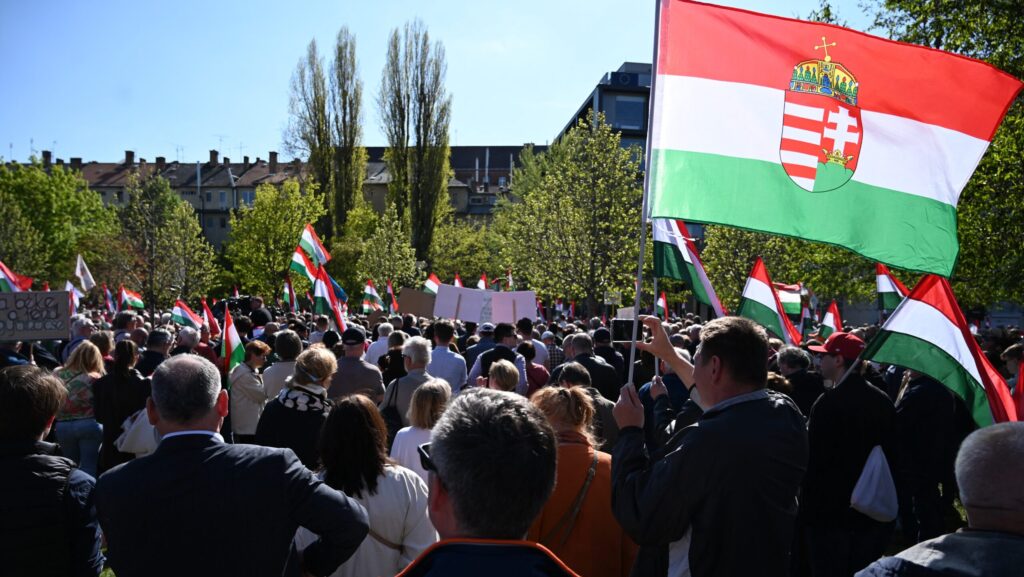Both EU and local elections were held in Hungary on 9 June, and they have taught us many lessons. Firstly, Fidesz and Viktor Orbán, even after two years terrible for the economy, despite the ‘clemency case’ and the appearance of a new challenger, Péter Magyar, still dominate Hungarian politics and are still able to obtain 45 per cent of the votes by rallying 2 million supporters to vote at any time.
So Fidesz has won a huge victory, the biggest in Europe, with more votes than the second, third and fourth parties combined. So, the foreign reader may ask, what is the issue at hand?
Well, the fact of the matter is that the governing parties have not received such a low percentage of votes in 20 years (although in terms of numbers they have never received so many votes, due to the extremely high turnout). Hence the result raises questions and requires analysis. This article aims to do just that.
Before the analysis, however, it is important to note that the voters of the party with the second best results, Tisza, are a freshly tossed salad with no real party affiliation. The Tisza party is really just a ‘one-man show’, organized around the leader, Péter Magyar, who exited of Fidesz earlier this year. This is also shown by the fact that those who voted for Tisza in the European Parliament election also voted for the far right in the countryside on the county lists (where his party did not run), while in the counties around the capital they mostly voted for liberal parties. So, we can conclude that both the rural national radicals and the liberal ‘intelligentsia’ in and around the capital voted for Péter Magyar’s party. Imagine all these people crammed into one room…
This new party basically destroyed the former Hungarian opposition, but how? Actually, there has never been a strong demand for the establishment leftist parties; the vast majority of their voters were never strongly affiliated with them. They simply vote based on their hatred (which is partly fed by the liberal media) of the national, conservative, Christian system of government that has been in power for 14 years. The importance and weight of Viktor Orbán is indeed so immense that every election revolves around his stay in power or his replacement.
‘To have Orbán or not to have Orbán’ is the Hamletian question in Hungary before every election.
Unfortunately, this approach also marked the two elections held on 9 June, neither of which was about the Hungarian government. In the capital, for example, some staunchly anti-Orbán left-wing mayors, who were scandalously ineffective, were allowed to remain in power only because they are not from Orbán’s Fidesz (and perhaps also because Fidesz has placed less emphasis on Budapest policies and funds). This is also confirmed by the fact that while the vast majority of right-wing voters consider the new challenger, the Tisza party, left-wing, the vast majority of left-wing voters consider it to be right-wing. So, logically, the right-wing voters voted against Tisza, but at the same time left-wing voters voted for someone they disagree with but who at least is not Viktor Orbán. And that is rather bad news for Hungarian democracy.
But why is there an anti-Orbán movement? Two years ago, Fidesz received 54 per cent in the parliamentary elections. Now, they got 45 per cent in the EP elections. What has happened?
First, the EP election is not as important, interesting and meaningful for most as general elections. In most people’s minds, it has less impact on their lives; Brussels is just a foreign city in a foreign country, where they have never been and probably will never visit. So, beyond the core voters, voters with weaker ties to Fidesz can easily choose to either stay at home or deliberately send a message to the leadership that they are disgruntled, essentially telling the government that they should get their act together for 2026. Probably, the latter has happened, with Fidesz mayors and county lists consistently doing better than the EP list. So, it seems to be a rather educated guess that there were about 10 per cent of Fidesz voters who went to the polls, and did vote for Fidesz mayors and county lists but did not put an X in the box next to Fidesz’s name on the ballot in the EP elections; they rather chose the new challenger, Péter Magyar.
But the lesser importance of EP elections is just one reason for the recent results. Still, if there had been a general election now, Fidesz would have got at least around 48 per cent and could have formed a government for the fifth time in a row with a two-thirds majority. The way I see it, there are deeper economic and socio-philosophical reasons behind the results: it seems that the incurable socio-cultural disease of Western, capitalist, globalist, liberal societies has spread to Hungary, that is, the emergence of hopeless singles in their thirties.
When the economy is doing well, these are changes that can be ignored. But now we’ve had a crisis for years, with a soaring inflation and rising energy prices. In 2023, every income decile saw its real wage fall. Of course, as things get worse, those who are disgruntled for other reasons become even more unhappy. The generation in their thirties is full of stress, panic, and existential anxiety because of modern liberal society, where it’s hard to find a partner and people don’t even really want to any more. These people also typically study until about they’re 28 and and thus delay starting building a career. So for this sizeable groups of single, childless people in their thirties, having to make a living on one income, many also renting a flat, the last two years have been particularly difficult; and on top of that, there is their fear of the future and loneliness that they have to worry about.
The political consequence of all this is the protest vote or a ‘slap in the face’ to the ruling parties. To those governing parties that are world-famous for their exceptionally generous family support system and demographic policies. Which begs the question: What should a governing party do when its policies that positively influence demographic trends alienate part of the populace?
When policies that are necessary for national strategy and the functioning of the state, put it at an electoral disadvantage?
These frustrated, single thirtysomethings, who were hit hard financially in the last two years, are angrier than ever about the government’s distribution of money to families. I’m only 25 and I want to start a family as soon as possible, but if I were 35, with no partner and hardly any money, and I saw that I wasn’t getting a penny from the state, meanwhile anyone who has one or two children at least was getting all the support in the world, I might also feel justified in my anger towards the government.
Of course, catering to childless single adults in a rapidly developing country where population decline is the biggest challenge is not smart as a matter of national strategy. But it could cost an election victory. Therefore, in my opinion, a strategic political decision may be required: to sacrifice some of the resources and channel funding to single adults as well, to allow conservative forces to remain in power, which would still be far more supportive of families and the nation than liberal forces.
One thing is for sure: people in their thirties are now voting less for Fidesz (only 12 per cent of its voters are in their thirties compared to almost a quarter of Tisza voters), and this issue needs to be addressed. Because many angry young adults, who will remain the driving force of the country for decades, are not happy with the government. This can be changed only by good governance, a favourable geopolitical environment, and dynamic economic and real wage growth.
In my opinion, special concessions are also needed, such as the move to a single-digit personal income tax (now at 15 per cent), which Fidesz has been promising for a long time, and the reversal of social taxes on wages in favour of the employee, so that they pay a smaller share and the employer pays more (now 13 and 18.5 per cent respectively). Either way, it will be hard work between now and April 2026.
The views expressed by our guest authors are theirs and do not necessarily represent the views of Hungarian Conservative.








